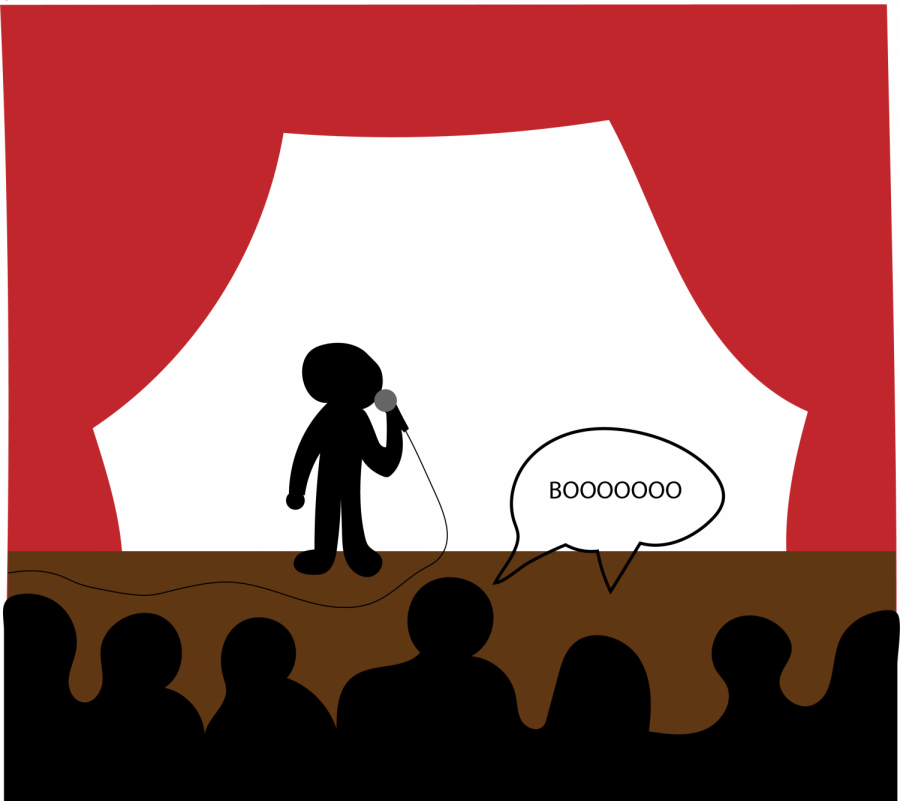Silenced or Shouted Down?
Freedom of Speech Does Not Mean Freedom From Accountability
July 31, 2020
Once again the ideals of free speech are being discussed in the news, with public intellectuals sounding the alarm that these essential protections are being lost in the ravenous jaws of “cancel culture.” Once again, they’re wrong.
The usual charge is that free debate is essential to the health of a democracy, and therefore the “silencing” of opposing viewpoints is a violation of their constitutional rights. True, it may be a private entity that’s “silencing” them and not the state, but there’s an expectation that outlets like universities, newspapers and social media companies must be fair and balanced. Private entities like these, however, have the right to determine the bounds of acceptable debate (at least when it comes to the debates they host) and do so in accordance with their own standards. To criticize these decisions, and the values that underlie them, is reasonable — but crying “free speech!” obfuscates the issue.
Of course, it’s also perhaps true that the entities who define the public square in modern times should be held to the same constitutional standards. Under the principles outlined above, if Twitter were to ban any posts mentioning Black Lives Matter, no one’s rights would be violated — and yet it is obvious that to do so would be a great injustice. This isn’t the main issue facing the people who signed the Harper’s Magazine “Letter on Justice and Debate,” though. They cry out for fear of indirect silencing, the creation of a climate in which they are punished for speaking their minds.
These fears are not entirely imaginary — the example of Colin Kaepernick’s blackballing from the NFL proves that. However, this rhetoric is most often heard from people who are asking six-figure sums to speak their minds from the loftiest platforms in the nation. It’s the height of arrogance for them to proclaim the death of the marketplace of ideas simply because people don’t want to buy what they’re selling — especially when they’re being paid by the word for it.
It’s hard to take complaints about silencing seriously when they’re being aired in places like The New York Times, Atlantic Magazine, The New Yorker and Harper’s Magazine. For all the claims about their own intellectual diversity and standing against the tide, a majority of the most vocal critics of cancel culture share the same orthodox centrist or center-left views — not only with each other, but with many of the most politically powerful people in the world. The worst material fate that awaits the purveyors of these “unpopular” opinions is a dropped book deal or speaking gig after an outcry on Twitter.
That is a common thread among many of these free-speech appeals — Twitter mobs trying to ruin their lives, cancel culture running rampant and so on. It represents what these plaintiffs, from disaffected students like Austin Tong to major columnists like Andrew Sullivan and Bari Weiss, fear most.
Accountability.
That’s what so-called “cancel culture” is about, after all: seeing the powerful and influential held accountable for the harm their actions — and words — cause. Sometimes that means exposing celebrities for sexual harassment; sometimes that means refusing to let someone with harmful views speak on campus. Often heard is the quote by Evelyn Beatrice Hall: “I disapprove of what you say, but I will defend to the death your right to say it.” However, it is truly out of touch to insist that someone should face no opposition for the ideas they promote — especially when the ideas themselves have very real effects on the same people the speaker demands to be shielded from.
After all, in the age of social media, millions of people who aren’t tenured professors or noted columnists are beginning to find platforms of their own. Many of these people are members of marginalized groups, finally able to make their voices heard after years of oppression — and in case the First Amendment crusaders have forgotten, all these people have the same rights they do. Landing a job as a columnist doesn’t give someone special privilege to speak, and the healthy debate that they laud as the lifeblood of democracy is not limited to the Opinions section. The fact that thousands of ordinary people can shout down New York Times editors and columnists is an achievement of free speech, not the death of it.
To all those who wish to defend their “free speech” from cancel culture: If your words are met with derision from the crowd, maybe you don’t have anything worth listening to. If your truths are so hard and inconvenient that you find your audience standing against you, try to do a better job of convincing them — or consider the possibility that they’re right and you’re wrong. To paint all your critics as mobs animated by groupthink, to condemn them as snowflakes for being too sensitive to appreciate your genius, to bemoan the death of free speech because not enough people are praising you — this rhetoric alienates, condescends and misses the point. If you want to keep your platform, you’d better earn it.













Bill Varnavas • Aug 3, 2020 at 1:24 pm
To your credit, you cited Bari Weiss’ (NY Times) resignation letter, which is something every college student should take the time to read, particularly those that are pursuing careers in journalism, education, or government.
https://www.bariweiss.com/resignation-letter
There were some great quotes in it, and here are some:
“…lessons about the importance of understanding other Americans, the necessity of resisting tribalism, and the centrality of the free exchange of ideas to a democratic society—have not been learned. Instead, a new consensus has emerged in the press, but perhaps especially at this paper: that truth isn’t a process of collective discovery, but an orthodoxy already known to an enlightened few whose job is to inform everyone else.”
“If a person’s ideology is in keeping with the new orthodoxy, they and their work remain unscrutinized. Everyone else lives in fear of the digital thunderdome.”
“All this bodes ill, especially for independent-minded young writers and editors paying close attention to what they’ll have to do to advance in their careers. Rule One: Speak your mind at your own peril. Rule Two: Never risk commissioning a story that goes against the narrative. Rule Three: Never believe an editor or publisher who urges you to go against the grain. Eventually, the publisher will cave to the mob, the editor will get fired or reassigned, and you’ll be hung out to dry.”
If anything, this should have served as a wake-up call for you, but nah, nothing to see here. I also really don’t follow your point about Weiss “fearing accountability.” For what exactly, and from whom?
Christopher Smith • Aug 2, 2020 at 8:05 am
When I read your words, I could not help but think of the passion of the Christ when He was “met with derision from the crowd” and spoke of truths…hard and inconvenient” and that He did not consider that they were right and He was wrong. Instead, he chose do die on the cross.
Ghandi, Dr. King, and John Lewis were met with derision from the crowd and spoke inconvenient and hard truths. I’m glad they did not take your advice.
As to Austin Tong, a picture of a man properly holding a perfectly legal rifle on his own property with a post containing a phrase from an iconic Revolutionary War flag and a date reference to the Tiananmen Square massacre is threatening? Do you really think that he was going to bring the rifle to NYC, where I suspect it would be illegal without a permit, so he could shoot fellow students at Lincoln Center based solely on the picture and text? It is just too hard for me to believe that this rises to an offense justifying a forced apology, mandatory race/diversity education and exile from campus.
Christopher Smith, Law’81
Andy Davalla • Aug 1, 2020 at 9:41 am
Have you read Andrew Sullivan? To say he fears accountability is either hilarious or sad, not sure which one.
Andy Davalla FCRH ‘99, Law ‘03